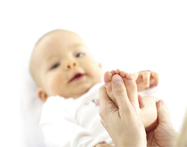The Art of Infant Massage

As new parents coping with a newborn baby, many questions come to mind like: Will I be a good parent? How will I deal when my baby cries? What can I do when my baby is in pain? And how can I ensure the health of my newborn?
Keeping these questions in mind, all new parents should add the skills of infant massage to their bag of parenting tricks.
Infant massage is an age-old healing art used by parents and caregivers on babies to improve: stomach discomforts, musculoskeletal injury (childbirth can cause trauma), increase circulation and strength in growing muscles/joints and also infant soothing.
The techniques of an infant massage class are designed to educate and support you in the beautiful art of massaging your baby. You will learn when, why and how to massage your baby. Learning your baby’s cues is very important in empowering your little one. It is also important to only massage when your child is willing to receive it. Asking permission, as funny as it sounds, is one of the most important things to remember before you start the massage session.
Techniques of massage can: relieve symptoms of colic and gas, help to facilitate motor coordination, reduce the effects of postpartum depression in the mother, relieve stress through increased relaxation for parent and baby and can help to regulate sleep patterns. Some parents use infant massage techniques only for soothing and bonding.
Studies that have been done by the Touch Research Institute of Miami have proven that babies need loving touch to grow emotionally and physically strong. Many parents reported that after a massage their babies slept better, fed easier (gaining more weight when needed) and experienced less stomach upsets. The TRI of Miami has done these studies on: pre-term infants, cocaine-exposed infants, HIV-exposed infants, infants parented by depressed mothers, and full-term infants without medical problems.
Research has also shown that dads play an important role in the soothing of your child too! While moms can usually soothe through breastfeeding; babies sense the warm touch and deep voice of dad because he is usually the only other familiar person that baby feels comfort with. For that reason, it is great for dad to learn how to perform infant massage as well.
To perform massage on your child, you will need: a cold-pressed edible oil (olive, sunflower, grape seed), a soft surface to lay your baby on (not a change table) and a warm environment. Along with the techniques you learn from a Registered Massage Therapist, you can be sure that your gentle touch will communicate a message of love to your baby because you are massaging with your heart and not just your hands.
The techniques of infant massage are tools that you can use after infancy and into childhood. For example, soothing a sore tummy with the I Love You and water wheel technique (used to treat infant colic and gas) can also be applied to a five year old child that is constipated or has an upset stomach.
Massage will help you to connect with your little one through positive touch, which will support the well-being of the parent-child relationship, while taking an active part in his/her health. If you would rather have a Registered Massage Therapist perform infant massage on your child, that is ok, but it is also important that you are empowered with the techniques of infant massage too.
Learn new tools to help you with parenthood and help your children adapt to this fast paced world by teaching them how to relax and share loving touch at a young age.
Nicole Nifo is an experienced Registered Massage Therapist. She has extensive training in Pregnancy Massage and has worked closely with high risk pregnant women at the Women’s College Hospital in Toronto. After becoming certified to work with infants and children, Nicole created the BabyLove Infant Massage workshops. Currently, Nicole is a Birth Doula (DONA) in training. Her goal as a therapist is to ensure that top quality care is given to mom and baby and to educate families on the many benefits of loving touch.
Visit her on the web at: www.FullyAliveCentre.com and Twitter: @FullyAliveWC or Call:416-578-5107





